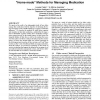Free Online Productivity Tools
i2Speak
i2Symbol
i2OCR
iTex2Img
iWeb2Print
iWeb2Shot
i2Type
iPdf2Split
iPdf2Merge
i2Bopomofo
i2Arabic
i2Style
i2Image
i2PDF
iLatex2Rtf
Sci2ools
CSCW
2006
ACM
2006
ACM
Of pill boxes and piano benches: "home-made" methods for managing medication
We report on the results of an ethnographic study of how elders manage their medication with the objective of informing the design of in-home assistive health technology to support “medication adherence.” We describe the methods by which elders organize and remember to take their medication—methods that leverage a kind of distributed cognition. Elders devise medication management systems that rely on the spatial features of their homes, the temporal rhythms of their days, as well as the routines that occasion these places and times to help recall and prospective remembering. We show how mobile health care workers participate in the development and execution of these systems, and “read” them to infer an elder’s state of health and ability to manage medication. From this analysis, we present five principles for the design of assistive technology that support the enhanced but on-going use of personalized medication management systems, and that also allow for remote health car...
CSCW 2006 | Elders Devise Medication | Medication Adherence | Medication Management Systems | Social Sciences |
| Added | 13 Jun 2010 |
| Updated | 13 Jun 2010 |
| Type | Conference |
| Year | 2006 |
| Where | CSCW |
| Authors | Leysia Palen, Stinne Aaløkke Ballegaard |
Comments (0)

